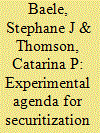|
|
|
Sort Order |
|
|
|
Items / Page
|
|
|
|
|
|
|
| Srl | Item |
| 1 |
ID:
157539


|
|
|
|
|
| Summary/Abstract |
Securitization theory has developed into a fruitful research program on the construction of security threats. The theory has experienced growing sophistication, and empirical studies have produced stimulating insights on issues as varied as the politics of immigration, health, climate change, or cybersecurity. Understanding how social issues become perceived as threats seems timelier than ever given the rise in securitizing narratives in recent political elections across the globe. We propose that this research agenda would benefit from broadening its methodological diversity. In particular, the use of experiments could complement existing methods in securitization theory, mitigate some of the program’s methodological weaknesses, and help explain when securitizing moves are likely to succeed or fail.
|
|
|
|
|
|
|
|
|
|
|
|
|
|
|
|
| 2 |
ID:
187311


|
|
|
|
|
| Summary/Abstract |
The increased support for NATO following Russia’s invasion of Ukraine is hardly surprising and matches theories of public opinion in times of war. This article unpacks this headline, considering not just Russian and Chinese pre-war behaviour but the underlying foreign policy attitudes of citizens across three different NATO member states. When grey-zone tactics were the preferred mode of action for both Russia and China, were citizens in NATO countries such as the US, the UK and a former Soviet state such as Lithuania in agreement on how to respond to threats? Using survey data from March 2021, Catarina P Thomson finds that although NATO is generally perceived as the first port of call, the dynamics underlying such support vary between these three countries.
|
|
|
|
|
|
|
|
|
|
|
|
|
|
|
|
| 3 |
ID:
185830


|
|
|
|
|
| Summary/Abstract |
Only two European countries – France and the UK, both NATO members – have nuclear weapons, and leading politicians have called for the UK and EU to maintain close military and security links post-Brexit. In the context of the Trident renewal debate and the UK government's recently published integrated defence and security review, this article uses data from the new UK Security Survey to analyse attitudes towards the possession of nuclear weapons among the British public. It assesses three key theorical strands in the wider scholarly literature on public opinion and states’ use of military force: domestic political attitudes, foreign policy predispositions, and the ‘gender gap’. We find that all three theoretical perspectives contribute to the underpinnings of contemporary public opinion towards nuclear weapons. Support for the retention of Britain's nuclear deterrent is associated with being a Conservative Party supporter, favouring Brexit, endorsing superior military power worldwide as an important foreign policy goal, wanting to protect the transatlantic relationship, and with being male. The article makes a distinctive contribution to the growing subfield of research on public opinion and foreign policy, while the findings advance wider empirical understanding of contemporary citizen engagement in a key dimension of security policy.
|
|
|
|
|
|
|
|
|
|
|
|
|
|
|
|
|
|
|
|
|